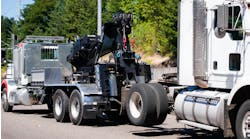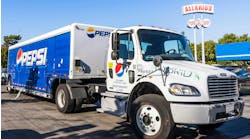Economics, safety, and the impact on highway infrastructure and the environment are the battlefields in an intensifying legislative struggle to determine whether commercial truck weight limits should be raised to 97,000 lbs. or not. And those issues are dividing key player within trucking itself.
"For our members, quite frankly, it's an economic issue," Chris Burruss, president of the Truckload Carriers Assn. (TCA), told FleetOwner. "To us, more weight does not seem to equate to more revenue, as we'd have to invest more in equipment and pay higher fees yet end up seeing [freight] rates stay the same. That's why we're not supporting a truck weight increase."
Todd Spencer, executive vp of the Owner-Operator Independent Drivers Assn. (OOIDA) believes heavier truck weights are also a safety hazard and cause infrastructure damage, as well as hurt truckers in the wallet.
Economics, safety, and the impact on highway infrastructure and the environment are the battlefields in an intensifying legislative struggle to determine whether commercial truck weight limits should be raised to 97,000 lbs. or not. And those issues are dividing key player within trucking itself.
"For our members, quite frankly, it's an economic issue," Chris Burruss, president of the Truckload Carriers Assn. (TCA), told FleetOwner. "To us, more weight does not seem to equate to more revenue, as we'd have to invest more in equipment and pay higher fees yet end up seeing [freight] rates stay the same. That's why we're not supporting a truck weight increase."
Todd Spencer, executive vp of the Owner-Operator Independent Drivers Assn. (OOIDA) believes heavier truck weights are also a safety hazard and cause infrastructure damage, as well as hurt truckers in the wallet.
"Heavier trucks put additional stress on our already deteriorating highways and bridges and endanger highway users," he said at a news conference held on Capitol Hill this week to endorse the "Safe Highways and Infrastructure Preservation Act" or SHIPA bill introduced by Rep. James McGovern (D-MA) and Sen. Frank Lautenberg (D-NJ) on March 19.
That bill, H.R. 1618, would prohibit states from allowing weights to exceed limits on the Interstate System unless those weights had been lawful back on July 1, 1956. It would also prohibit trailers longer than 53 ft to operate on the National Highway System – which includes the Interstate System – unless the given state had allowed the longer trailers as of June 1, 2008, while restricting combination trailers to maximum lengths established also as of June 1 last year.
"Economically for truckers, raising weight limits would be suicide," OOIDA's Spencer had previously told FleetOwner. "If weights are increased, the already limited number of viable routes available to commercial motor vehicles would further be diminished. Efficiency in the trucking industry would be lost, not gained."
Not so fast, contend supporters of a competing bill that aims to boost allowable truck weight limits to 97,000 lbs. – HR 1799, the "Safe and Efficient Transportation Act of 2009," or SETA introduced by Rep. Michael Michaud (D-ME) and Rep. Jean Schmidt (R-OH) on March 30.
Under the SETA bill, individual states would be able to increase allowable weight on a single trailer up to 97,000 lbs on their Interstate highways. Such vehicles, however, would be required to add a sixth axle to the tractor- trailer for better braking and handling. In addition, the law would boost the heavy vehicle use tax (HVUT) by 40% to 50% to cover the cost of any infrastructure improvement needed, said Jake Jacoby, executive director of lobbying group Americans for Safe and Efficient Transportation (ASET).
"The Department of Transportation's own research found that moving to 6-axle/ 97,000-lb vehicles would reduce pavement repair costs by $2.5 billion over the next 20 years as carrying more weight would reduce the overall number of trucks on the roads," Jacoby told FleetOwner. "The DOT also found, however, that bridge wear and tear would increase. That's why the HVUT increase is in there – to make sure the bill is a net-positive for the federal government."
Jacoby added that highway safety would actually improve, as higher weight limits would reduce the number of heavy trucks on the road and vehicle miles traveled (VMT) by big rigs would decline – pointing to the outcome of a similar truck weight increase effort in Great Britain.
In 2001, Britain increased its commercial truck weight limits from 41 tons (90,000 lbs) to 44 tons (97,000 lbs). Data tracked between 2001 and 2007 showed that while tonnage increased from 1.58 billion to 1.86 billion tons, vehicle miles traveled stayed essentially flat – while the fatality rate for heavy vehicles dropped from 1.9 per 100-million vehicle kilometers traveled to 1.3.
The environmental benefit of increasing truck weights is gaining support from the American Trucking Assns. (ATA) for HR 1799, as this trucking lobby expects improved productivity could reduce carbon emissions from truck transportation by as much as 42-billion lbs annually.
"As part of our sustainability initiative, we support a number of reforms to federal truck size and weight regulation," said Gov. Bill Graves, ATA president & CEO. ""The use of more efficient trucks, such as those allowed under the bill, will significantly reduce the trucking industry's carbon output."
Graves also pointed to a recent study by the American Transportation Research Institute (ATRI) – the ATA's research arm – that found a 97,000 lb truck is 17% more fuel-efficient on a ton-mile basis than a truck with a gross weight of 80,000 lbs, resulting in 17% less output of carbon and other pollutants.
Despite those advantages, however, many carriers still don't find raising truck weights to be a "slam dunk" by any means, TCA's Burruss told FleetOwner.
"It's not going to benefit the majority of truckers; that's why there are so many divisions on this issue," he said. "Many dry van truckload carriers cube out before they weigh out anyways, so it wouldn't help them. There's even division among flatbed haulers around the cost of upgrading trailers vs. the potential for revenue. My concern is, if the industry can't speak with a collective voice on this issue, why should we be bringing it before Congress?"



